Well, it’s that time again– October. So it’s time to attempt another 31 Days of Horror. 31 days! 31 horror movies! One viewer! ONE SURVIVOR!
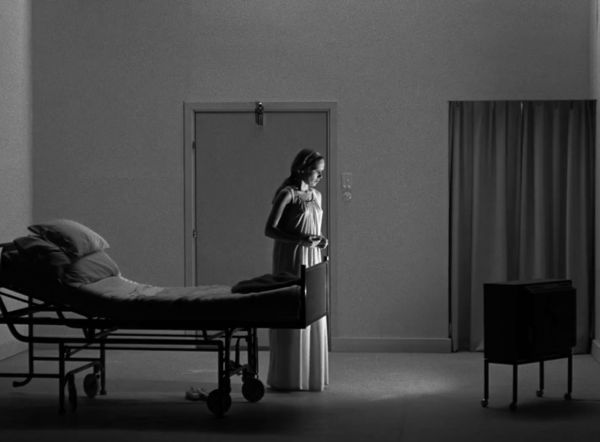
Here are my basic rules this year: I’d like to maintain a ratio of at least ten percent or less of movies that I’ve already seen (so, three); I’d like to run the gamut from bizarro intellectual art-house horror, to spooky eerie ghosties, to supernatural jump-scares, to straight-up slasher goretown Video Nasty; I’d like to post about it at least three times a week (so at least ten times in October); and I’d like to watch at least 31 movies.
I’m sure that I’ll bungle at least one of those. Okay, let’s get into it!
Last year, I had such a mind-blowing experience with Bergman’s Hour of the Wolf that I figured I’d start this year off with another Bergman film. Hour of the Wolf is generally considered to be his only true horror movie, but I dug around, and found another one that’s been labeled “modernist horror” (also “psychological drama,” “experimental,” et cetera). So I figured what the heck. This is Ingmar Bergman’s Persona.
After I watched this, I got hella baffled, and I dug around on the internet and read a lot of academic criticism, and a lot of bloggers’ takes on what this movie means and what actually happens and how to interpret it and basically found that I disagreed with everybody. I’m kind of loath to get into it here, especially because my views on interpretation of this particular movie tend toward the experiential, but I reckon that’s what a goddamn blog is for. Right?
There are some spoilers ahead. The movie’s fifty years old. Nothing I am going to say is going to make it less enjoyable (and intriguing) for you to watch the movie; besides that, you’ll probably disagree with me anyway. I hope you do. I hope you post about it in the comments.
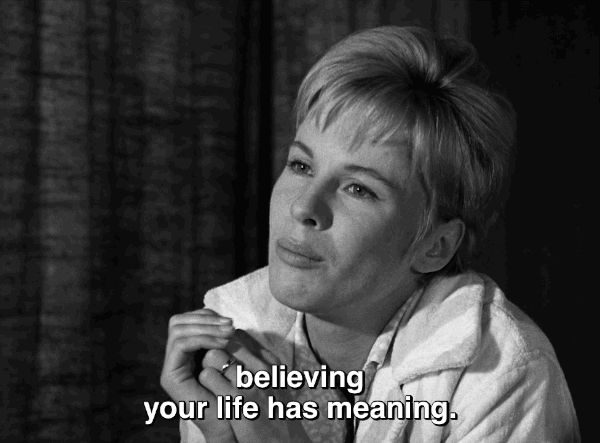
I don’t know if I’d call this “modernist horror,” as many have. It’s definitely existentialist horror, with more than a handful of postmodernist bits.
Before I get into the meat of the movie proper, it seems necessary to discuss the opening credits. A white screen, screeching violins. Flashing, almost strobe-like lights. Footage of cameras and projectors. A jarring pastiche of filmstrip count-downs and strange footage culled from disparate and odd sources. Footage of brick walls. An old-timey cartoon (upside-down). An erect dingdong. A skeleton chasing a man. A nail being hammered into a palm. A snowdrift. A lamb being slaughtered. Then: bodies lying peacefully on autopsy tables. A boy wakes up on a similar table. He’s reading Mikhail Lermontov’s A Hero of Our Time. He slowly turns to the camera and raises a hand. The shot switches to shooting from behing him, over his shoulder, as he runs his hand over a window, behind which is the blurry, larger-than-life face of a woman.
It’s a bit hard to encapsulate what the movie’s about, so here’s what the first ten minutes of the movie (after those credits) contain:
An actress, Elisabet Vogler, has had some sort of existential panic attack on stage, and has now gone mute. There’s nothing physically wrong with her, but she won’t move or speak. She’s hospitalized. While in the hospital, she’s placed under the care of a nurse, Alma. The head of hospital spouts a lot of (almost certainly mostly incorrect) existential theories about Elisabet’s mental state, the reason for her muteness and withdrawing:
The hopeless dream of being… The feeling of vertigo and the constant hunger to be unmasked once and for all. To be seen through, cut down… perhaps even annihilated. Every tone of voice a lie, every gesture a falsehood, every smile a grimace… Your hiding place isn’t watertight enough. Life oozes in from all sides… No one asks whether it is genuine or not, whether you’re lying or telling the truth. Questions like that only matter in the theatre, and hardly even there… you’ve turned this apathy into a fantastic setup… I think you should play this part until it’s played out, until it’s no longer interesting. Then you can drop it, just as you eventually drop all your other roles.
Some of the criticisms of this movie have zeroed in on this as being a true, whole, and accurate reflection of Elisabet’s mental state. I immediately thought that much of it was dismissive horseshit. It’s the way a person who has never suffered clinical depression describes what they imagine clinical depression to be. It implies a choice. It’s existential angst through cynical opera glasses.
Anyway, after this little speech, the doctor decides that the best place for Elisabet to make a recovery is at the doctor’s summer home, and she sends Elisabet and Alma out into seclusion for recovery.
In contrast with the doctor’s assessment, it’s clear that Elisabet is actually suffering. Twice during the course of the movie, she encounters real-life, external, third-party horrors. Once, in the hospital, she turns on the television and watches the self-immolation of a Buddhist monk during the Vietnam war, and it affects her profoundly. Later, at the summer home, she finds a photograph of Jews being cleared out of the Warsaw Ghettos, and reacts in much the same way: with horror, and sadness, and guilt (not out of any complicity, but merely due to the fact of survival, her more comfortable and privileged existence; both the possibility for her to experience joy in her part of a cruel world, and her inability to experience joy regardless of her privilege).
At one point, Alma asks to read aloud a passage from her book:
Elisabet? Can I read you something from my book? Or am I disturbing you? It says here: “All the anxiety we bear with us, all our thwarted dreams, the incomprehensible cruelty, our fear of extinction, the painful insight into our earthly condition, have slowly eroded our hope of an other-wordly salvation. The howl of our faith and doubt against the darkness and silence is one of the most awful proofs of our abandonment and our terrified, unuttered knowledge.” Do you think it’s like that?
Elisabet smiles sadly and nods.
What this movie is really about is self-awareness. Not just in the sense of being aware of one’s surroundings and general state, but being aware of one’s actions and how they are perceived by others. Being aware of one’s actions as a performance, whether intended as such or not, being put on for others. You go to work, you stand around the water cooler, you talk about television. This is a performance. You come home, you wash the dishes, you watch television. This is a performance.
If you’re lucky, it’s an unthinking performance. If you’re lucky, you live in the moment, like Alma. Like meditators try to do. Like many of us try to do.
If you’re unlucky, you’re constantly analyzing your actions and their effect on others. If you’re aware enough to scrutinize your movements, language, and place in the universe, in an existential way and on a rolling basis, then you almost certainly exist in a constant state of anxiety, guilt, deep-seated existential fear; then a secondary layer of self-criticism and shame, for being so narcissistic and self-centered in a world that is so horrible to so many living beings (not least of which being other mistreated humans); then, a third layer of self-criticism and shame, for things you’ve actually done which are shitty and which have hurt other people.
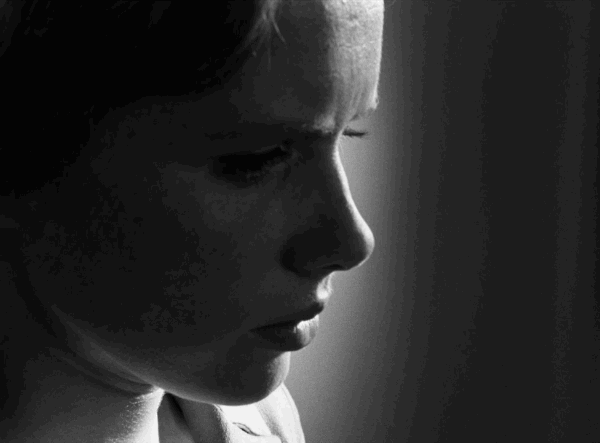
Life grinds on at the summer house. Elisabet still doesn’t talk. Alma makes some brazen confessions about her wrongdoings one night when they’ve both been drinking. The two begin to connect on a more personal level. Elisabet writes a letter to the doctor, Alma drives it into town with her mail. On the way, she notices that it’s unsealed, and she reads it. It makes reference to her confession in a lighthearted and jokey way, and talks about her as being a good “study subject.”
This letter should be read in two ways. One, on the surface level, there’s probably some truth to the fact that Elisabet enjoyed Alma’s company (and confessions) on a purely spectacular level, meaning that she enjoyed watching her and viewing her dispassionately. However, it’s clear that she’s actually come to care for Alma, and may just be crafting this letter to the doctor to show some progress has been made in terms of her being able to “study” people with an eye towards using that in her (eventual) recovery and return to the stage.
Alma takes it badly.
At this point, I’d nearly forgotten that this was called a horror movie at all. The first five minutes– the opening credits– was pretty creepy, that imagery and that music. But then it just got kind of sad and dark. Until now.
Alma accidentally drops a glass, which breaks. She intentionally leaves a shard on the ground. Elisabet steps on it and immediately realizes what has happened, and that it was intentional. She makes eye contact with Alma, and then the entire film goes nuts.
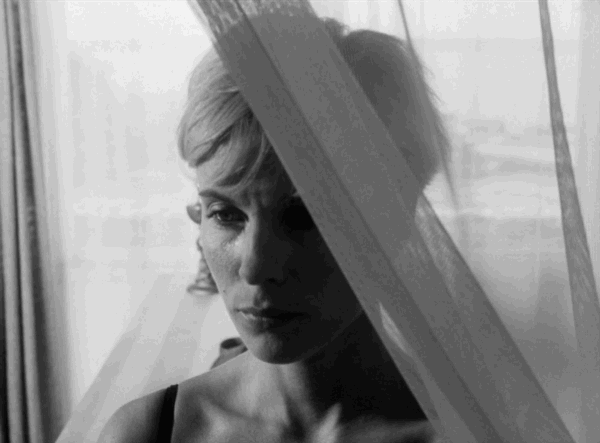
The screeching violins come back in. Flashes of images from the opening credits recur.
I was watching this late at night, and I got goosebumps and horripilation like crazy. Fucking horrifying.
The two women scuffle. Their personalities become blurred. Events occur which may or may not be real. One may be mistaken for the other, and may fall into the role.
At the climax of the movie, Alma sits down across from Elisabet and begins a long accusatory monologue. I’ll try to sum up a bit, and then hit you with a quote. The gist is this: Elisabet was told by someone at a party that she lacked the capacity to display motherliness in her acting. In an attempt to add this to her arsenal, she got pregnant. Once pregnant, she became horrified at the concept of being pregnant, and of eventually having a child. She attempted to abort. She hoped for tragedy that would free her of the burden of motherhood. The child was born, which was awful for her. Eventually, she got a nanny and returned to work acting, but Elisabet felt no relief.
Now here’s a quote:
But the suffering wasn’t over. The boy was gripped by a massive and unfathomable love for his mother. You defend yourself in despair. You feel you can’t return it. So you try, and you try… But there are only cruel and clumsy meetings between you. You can’t do it. You’re cold and indifferent. He looks at you. He loves you and he’s so gentle. You want to hit him because he doesn’t leave you alone. You think he’s disgusting with his thick mouth and ugly body. His moist and pleading eyes. He’s disgusting and you’re scared.
Fucking horrifying, man.
I know the last thing that most readers want to run into here is my discussion of being a new father, and how that impacts my worldview and the way I approach horror movies, and how everything’s different now that I have a kid, and all that “chicken soup for the soul” stuff, but this weird monologue punched me right in the guts.
Not because I feel that way. Oh god, no. But because before the kid came around, I was terrified that I would feel that way. I read some about postpartum depression, and about these issues surrounding new parents, and this is a thing that happens. Some parents just don’t connect with their kids, and that’s awful. Bringing a kid into the world and then letting that kid down seems like the most horrible thing– and yet it happens. Some bonds just don’t form between some parents and some kids. That didn’t happen to me, for which I am most grateful, but I was afraid that it would.
So listening to this horrible monologue– twice– and watching the way that it affects both of the parties involved, was the most desperately uneasy, uncomfortable, and repulsive emotional reaction that a horror movie has conjured out of me in a long time. Because you can see the desperation in Elisabet’s eyes, the shame and the guilt. And you, the viewer, are forced to empathize with it, to feel sorry for this woman who crosses the most unbearable, uncrossable line, whether voluntarily or not.
After this, there’s some more weird hallucinatory sequences with some strange violence and vampiric behavior. One personality rejects another, perhaps, but it’s all denouement.
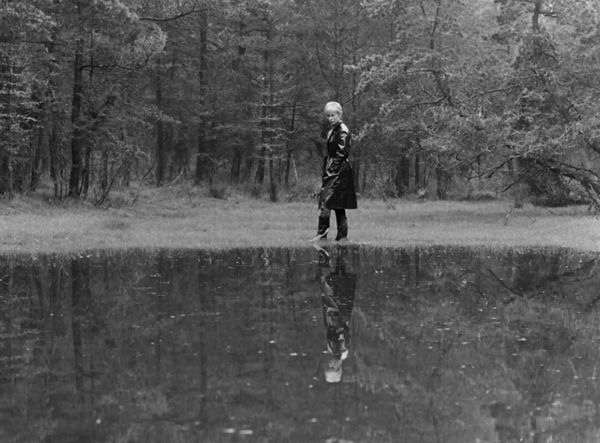
We see a camera crew filming Elisabet wearing a swimsuit on a beach. Alma packs up the house, puts the chairs on the tables, and gets on a bus. As she leaves, we see Elisabet turn toward her, wearing stage makeup. The bus drives away. The camera pans to some rocks and dirt.
End credits.
The credits list five people. One of them is the little boy in the beginning credits– remember him? It credits him as “Elisabet’s Son.” NOTE: I watched the Criterion edition, which is uncensored (including the boner, which was excised in other cuts) and with new fresh subtitles. And, apparently, new end credits– when I looked up the cast on IMDB for the child actor, he’s listed as playing “Elisabet’s Son (uncredited).”
I’d never heard of A Hero of Our Time, the book Elisabet’s son was reading, but it seemed important, so I read what Wikipedia had to say (this is a blog, so I’m not going to even bother with other sources). It’s kind of the key to the whole movie. It’s about this fella named Pechorin, who’s a total asshole. To wit, from Wikipedia: “…calculating, manipulative, emotionally unavailable and arrogant… sensitive and cynical as well as intelligent… broods on the futility of existence… a distanced, alienated personality.” He cheats on his girlfriend, he’s a misogynist womanizer, he murders one of his friends, he kidnaps a lady and pressures her into sex. Dude’s life is basically an unbroken chain of dick moves. From Wikipedia again:
… one is presented with a moment of hope as Pechorin gallops after Vera. The reader almost assumes that a meaning to his existence may be attained and that Pechorin can finally realize that true feelings are possible. Yet a lifetime of superficiality and cynicism cannot be so easily eradicated and when fate intervenes and Pechorin’s horse collapses, he undertakes no further effort to reach his one hope of redemption: “I saw how futile and senseless it was to pursue lost happiness. What more did I want? To see her again? For what?”
At the end, he becomes broken down by the collective burden of his shittiness. The girl he kidnapped gets kidnapped by someone else and is wounded mortally. She talks to him as she dies, and then he falls into a funk and also dies.
The parallel is clear. Any attempt to disengage from the inherent cruelty of the world– whether it be amoral and logical withdrawal, as Pechorin’s, or physical and communicational, as Elisabet’s– is not a real disengagement or withdrawal. Existence in the world is complicity. Emotional withdrawal from the world is impossible. The only real response to being situated in an uncaring universe is to care yourself, and to take action accordingly. The failure of these characters to connect on a real, human, empathetic way, and to make any attempt to affect positive change, is what drives their inevitable existential failures.
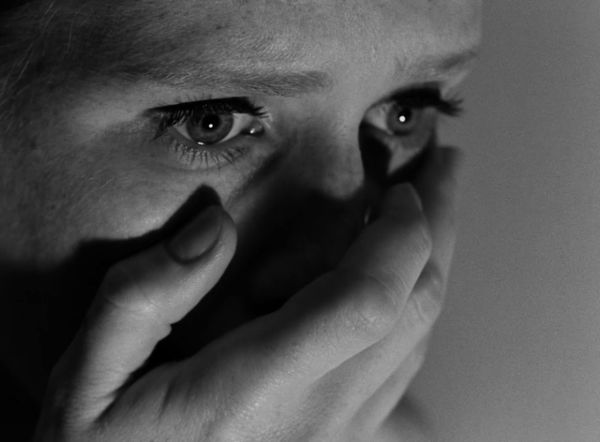
The secondary parallel is, of course, the comparison between motherhood and artistic creation. Here’s where we get into some interesting interactions with the postmodern touches: the camera being seen in the beginning and the end; the boy looking at the camera, and then being shown stroking the “screen,” behind which is his mother; the middle piece where the film literally breaks and burns within the movie itself. This is artifice, says Bergman, but the footage that most moves the characters is real: the self-immolation of the monk, the photograph of the Warsaw Ghetto. The inclusion of the slaughtering of the lamb is deeply disconcerting.
Bergman’s making a larger point here about the nature of abstraction and removal from immediacy of the subject. The footage of the “real” atrocities is the base level, the most horrific. The rest of the movie, about the characters, which we the audience inherently recognize as fictional, is a second layer; although it can also be emotionally moving, it cannot have the same impact on a real-world horror level. It is much harder to confront the real-world horror, but the artificial, abstracted narrative cannot impact as deeply.
When Pechorin and Elisabet try to abstract, withdraw, remove, they find themselves ultimately being destroyed or damaged. They are unable to escape the reality of the world they are a part of. What does it mean for an artist to have a layer of abstraction that is a necessity in any fictionalized or created art? What does it mean for us as an audience to understand implicitly that there is a layer of abstraction involved in any constructed narrative?
Here’s a quote from Bergman himself about Persona:
… [I]n Persona— and later in Cries and Whispers— I had gone as far as I could go… in these two instances when working in total freedom, I touched wordless secrets that only the cinema can discover… Persona saved my life— that is no exaggeration. If I had not found the strength to make that film, I would probably have been all washed up. One significant point: for the first time I did not care in the least whether the result would be a commercial success.”
This last point– not caring about the commercial success of the movie– can be seen in two ways. If this is interpreted as meaning that Bergman only cared if it succeeded on a personal, emotional level, for him exclusively, then he has done the opposite of what Elisabet did with her child. If this is interpreted as Bergman saying that this was just something he needed to produce, to expel, something to complete with no further eye for what happens afterward, then he’s done exactly what she did, and simultaneously demonized and humanized her (and himself) for it.
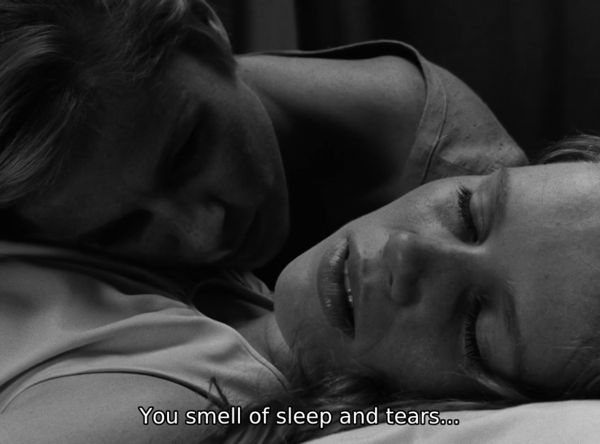
Next time– something way more straightforward. And way shorter. It will probably have lots of blood, and maybe boobs. Blood and boobs!
